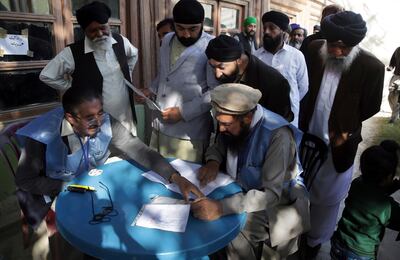Despite being dealt a major blow this year, Afghanistan's Hindu and Sikh communities came out in full strength on Saturday to vote in the country's parliamentary elections.
For the first time since the fall of the Taliban in 2001 these two minorities are voting to elect a member of the lower house, a seat they will hold jointly.
"This is our chance to put our representative in parliament," Ram Prakash, a Hindu businessman from Kabul told The National.
Their candidate, Narendra Singh Khalsa, is the son of original nominee Avtaar Singh Khalsa - killed in July in a suicide attack in Jalalabd.
The blast killed 17 other members of the already dwindling communities.
_________
Read more:
Afghanistan delays vote in Kandahar after killing of commander
Afghan elections 2018: what you need to know
Youth wave challenges Afghan elections
Taliban kills 26 Afghan forces as election bloodshed continues
________
"The community is still recovering from the tragedy but we have to continue to move forward together. This is that opportunity for us to seek our rights as Afghans," Mr Khalsa told The National. "Of course we are sad and upset, just like any Afghan is these days. We are faced with difficult times, whether we are Hindus, Sikhs or Muslims."
Mr Khalsa said he hoped to "end discrimination against the Hindus and Sikhs. A lot of Afghans are not aware of our history in the nation building of this country. They often think we have come from Pakistan or India. But we are natives of Afghanistan".
Despite official political representation and freedom of worship, many face prejudice and harassment as well as violence from militant groups, prompting thousands to move to India, their spiritual homeland. India has issued long-term visas to members of Afghanistan’s Sikh and Hindu communities.
“Many more Hindus and Sikhs left after that attack. I don’t know the exact figures but around 700 to 800 Hindus and Sikhs remain in the country,” Mr Prakash said.
The Sikh community now numbers fewer than 300 families in Afghanistan, which has only two gurdwaras, or places of worship, one each in Jalalabad and Kabul, the capital.
Although almost entirely a Muslim country, Afghanistan was home to as many as 250,000 Sikhs and Hindus before a devastating civil war in the 1990s.
Even a decade ago, the US State Department said in a report, about 3,000 Sikhs and Hindus still lived there. Today most are based in Kabul and Jalalabad, with a small community in Ghazni.
"Every one of us in Kabul and Jalalabad came out to vote. However, our brothers in Ghazni couldn't vote because of the issues there," Mr Prakash lamented, referring to the delay in the elections in the Ghazni province owing to the security and political situation. The province was besieged for five days by the Taliban in August and the situation remains tense.

Like most Afghans, their voting experience was affected by logistical and security issues.
“Many of our names didn’t appear in the lists,” Mr Prakash said, adding that many families who had registered together found only some of their relatives on the list. “We were disappointed with how it was managed.”
But Mr Prakash is confident he reflects the sentiment of the small but historical Afghan community when he explains that both Hindus and Sikhs are committed to bringing their representative into government.
“The Afghan Hindus who remain are those who can’t leave because they are too poor,” Mr Prakash said. “But today is significant for us because even if we can’t leave for safety, at least we can ensure that our representative is part of the government.”
“He will be our voice in the establishment, and will ensure that our rights and our identities are protected. Because we are also Afghans and we should have a say in the government,” Mr Prakash explained.
Being the only minority candidate running for a seat Mr Khalsa is likely to secure his place without any hurdles.
The democratic process, however, remains significant to the Afghan Hindus and Sikhs. “We have been given this opportunity to participate in the government. If we don’t take it now, we will forever remain marginalised,” said Mr Prakash. “If we don’t look after ourselves, who will look after us?”

